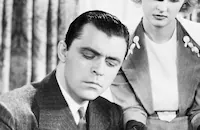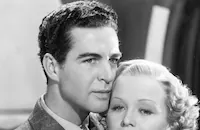Everybody's Dancin'
Cast & Crew
Will Jason
Spade Cooley
Dick Lane
Barbara Woodell
Ginny Jackson
Hal Derwin
Film Details
Technical Specs

Synopsis
In 1917, "Papa" Steve and "Mama" Mary Berne's Waltzland Ballroom, an elegant establishment on the Santa Monica Pier, is doing a thriving business. During the show one night, band leader John Martin proudly brings his young son Donald on stage to play the violin. Later, John and Steve join the service and depart for Europe, but their ship goes down in a U-boat attack in the mid-Atlantic. Mama consoles Donald, who dreams of being an orchestra leader when he grows up, and sends him to Texas to live with his aunt. The popularity of waltz music declines over the years, and by 1950, Mama has had to close the ballroom. Her granddaughter, Ginny Johnson, tells her boyfriend Bill, an aspiring songwriter who operates a refreshment stand at the beach, that she is going to move East to take a job singing with a band. While Bill is serving lunch to irascible Southerner Ed Harrison, known as the Colonel, the radio plays a song by famous band leader and fiddler Spade Cooley, and the Colonel offers to arrange for Spade to play at the ballroom. The Colonel sneaks onto the lot at Nassour Studios, where Spade and his band are rehearsing, and asks him to play at the ballroom. When Spade turns him down, explaining that he is in Los Angeles to pursue film and television projects, the Colonel decides to make the ballroom the setting for a television program. At KTLA Television Studios, the Colonel calls on Landon, the station manager, and tells him that Spade will open at the ballroom next week. When Landon inquires about the sponsor, the Colonel persuades the Ajax Motor Company to underwrite the show and promises to display their new car on the dance floor. The Colonel's plans are spoiled, however, when Spade tells him he is not interested in doing a regular series. The Colonel goes back to the pier, and while he is breaking the news to Ginny and Bill, Spade enters Mama's office. She warmly greets him as Donald Martin, saying he is the spitting image of his father, and Spade tells her that he has changed his name. When Spade realizes that the Colonel wanted him to play in Mama's ballroom, he quickly agrees, and the Colonel has Waltzland renovated. He is unable to pay the bills, however, and when the contractor threatens to prevent the club from opening, the Colonel decides to raffle off the display car. The night of the show, the contractor arrives with a deputy bearing a restraining order, but the Colonel locks them in an office. The costume designer then shows up demanding that the Colonel pay his bill or allow his wife to perform her chicken imitation on the show, and the Colonel locks them up as well. They are soon joined in the crowded office by Landon and the irate sponsor. The show, which features western music and acrobatic performances, is a success, and the raffle brings in enough money to pay for the car and cover the bills. Later, as they watch Bill and Ginny waltz, Mama tells the Colonel that he is a genius.

Director

Will Jason
Cast
Spade Cooley

Dick Lane
Barbara Woodell
Ginny Jackson
Hal Derwin

James Millican

Lyle Talbot

Michael Whalen

Sid Melton
Tex Cromer
Les Anderson
Fred Kelsey
Dorothy Lloyd
Bobby Hyatt
George Meader
Dan Rense
Sons Of The Pioneers
Chuy Reyes
The Flying Taylors
The Great Velardi

Roddy Mcdowall

Adele Jergens
Jimmie "shamrock" Ellison
Russ "lucky" Hayden
Virginia Macpherson
The Medians
Crew
George Bahr
George Beatty
Alfred Berke
Jenny Lou Carson
Spade Cooley
Spade Cooley
Spade Cooley
Albert Glasser
Gary Harris
Jack Harvey
Will Jason
Al Kegerris
Benjamin Kline
Edward Mann
John H. Mclaughlin
Ray Mercer
Yolanda Molinari
Bob Nunes
Bob Nunes
Dorothy Raison
Chuy Reyes
Smokey Rogers
Melville Shyer
Tim Spencer
Paul Stanhope
Britt Wood
Dick Zalud

Film Details
Technical Specs

Quotes
Trivia
Notes
A pre-production news item in Hollywood Reporter referred to the film as Western Varieties. Jimmie "Shamrock" Ellison's name was misspelled in the opening credits as "Jimmy 'Shamrock' Ellison." Although the credits say "Introducing Hal Derwin," Derwin actually made his feature film debut in the 1944 film Thirty Seconds Over Tokyo (see below). Spade Cooley was the host of a very popular television program, The Spade Cooley Show, which was broadcast from a Santa Monica ballroom over local station KTLA from 1948-1956. For more information about Cooley's life and career, see the entry below for In Old Cheyenne.












